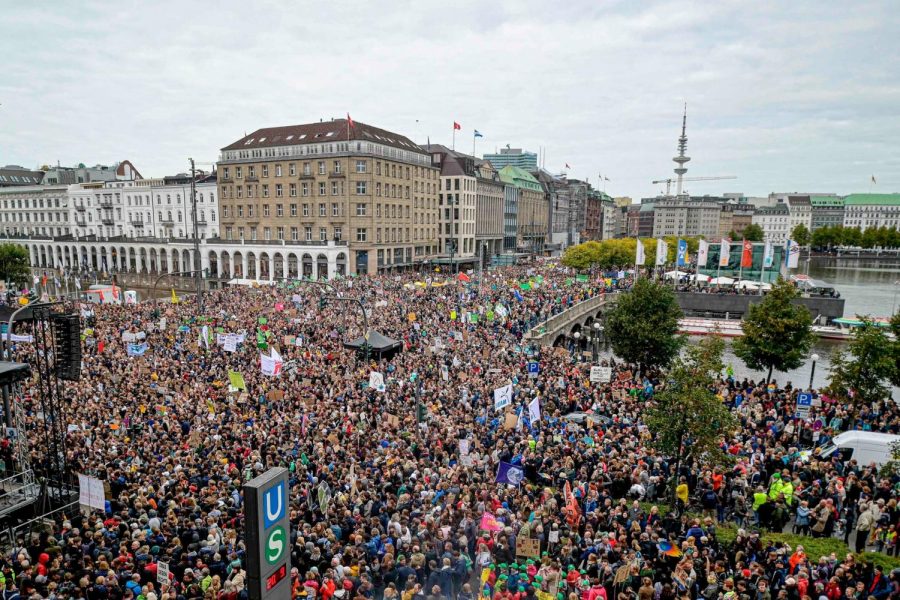The Climate Strike is Valuable. But It’s Not a Substitute for Real Action.
Climate protests in Germany.
Sep 20, 2019
On Fri. Sept. 20, cities across the world held protests against policymakers’ almost ubiquitous inaction on climate change. Led by Greta Thunberg and other youth climate activists, protesters rallied together in a call to preserve a habitable planet in the future. Complete with sardonic signage and catchy chants, students organized across continents, unanimous in their formidable message: no profit on a dead planet.
Indeed, any climate action is good and draws necessary attention to the most severe crisis humanity has ever faced. Never before have we as a species faced such a tangible threat to our future as a civilization. Rising global temperatures, fossil fuel reliance, oceanic pollution and acidification, and Amazon deforestation are just the tip of the climatic iceberg. The IPCC has stated we have twelve years to save our planet from irreversible ecological tipping points, the likes of which are quite literally impossible to predict.
Such a large-scale protest is something to behold when the President of the United States is actively rolling back even the most basic of environmental protections. More than 80 environmental rules in total are on the way out or already gone. Fifty-three rollbacks have been completed, mostly targeting infrastructure and emissions, with another 32 in process. In an age of widespread climate denialism and torpidity, the climate protests can at least assure us that there are rightfully concerned people out there.
The protest is also admirable for the political involvement it promotes. Nearly two-thirds of American climate strikers are women and girls, and a recent survey determined that half of them had participated in a different protest — commonly for gun control or women’s rights. This is somewhat bittersweet; finally, youth are involved in politics — but at what cost? The utter failure of elected officials to break from the shackles of corporate influence on every issue has engendered a rebirth of activism.
The desperation many climate strikers feel is palpable and valid. It would be asinine to doubt the fear and uncertainty young people feel about what the future will ecologically be like. While other generations felt the dread of economic uncertainty and social ills, they never had to seriously consider if there would be any of the Amazon left by their thirties. There’s no precedent for the right potion of activism, politics, and science that saves humanity from the brink. We, young people, are figuring it out ourselves, and watching the president leave the Paris agreement for kicks is like a kick in the teeth. Sometimes indignation boils over — and this, if anything ever was, is righteous indignation.
Every virtuous social movement runs the risk of being coopted by unbridled anger and, in doing so, losing its political leverage. That is my worst fear of the climate movement.
Reactionaries, corporate executives, and comfortable conservatives want nothing more than to see the climate movement sputter out and to have the honor of sweeping it under the rug of corporate governance. The response to the protests will be an ostentatious unveiling of ponderous, “pragmatic,” patchwork solutions pre-approved by oil and gas giants. It’s already happening in Germany, where $60 billion is being blown on a plan that climate scientists say lacks any ambition.
Already, Germany’s paltry plan perfectly illustrates the limits of protests. Germany’s climate apathy isn’t an accident — the new policy is a balancing act between quelling public outrage and appeasing powerful corporations.
Why is this the case? Exxon-Mobil will always have more money than activists to flood the checkbooks of Congress and Parliaments. British Petroleum will always have more lobbyists on its payroll than Greenpeace. Chevron will always have more powerful lawyers than the entire firm of Earthjustice. And in doing so, Big Oil’s rapacious cohort will always retain inexorable political leverage. As long as politicians court their money and invite their lobbyists to lunch, those companies will have their pick of presidential candidates’ plans, legislation, and EPA rules.
This may seem overly pessimistic, but it’s an unflinching view of today’s political climate. The political hierarchy doctrine of “corporations above citizens” transcends borders. To have a chance at a future with birds chirping, oceans we can swim in, and an arctic with ice, the international climate movement must develop an infrastructure that can compete with Big Oil and Big Ag.
Although it’ll never have a payroll, the climate movement can have involved voters committed to a sustainable future. It can recruit more candidates like Rep. Alexandria Ocasio-Cortez (D-NY) and Sen. Ed Markey (D-MA) on a larger scale to pioneer more ideas like the Green New Deal. We can push to try fossil fuel executives for crimes against humanity, and use the full power of the legal system against climate crimes. Electing a president with an ambitious, effective climate plan is as important as ever.
There are individual things we can do to make a dent in this crisis, too. We can all stop eating meat. We can pressure universities to divest from fossil fuels. We can support lawsuits against unconstitutional environmental rollbacks. We can buy electric cars and call our representatives. Install solar panels in your house, shop for organic food, and grow your own vegetables in the summer. Make climate change your cause to vote. Support the repeal of Citizens United. Read and support independent journalism.
When you get home from the climate protest, remember, there is real work to be done. Protests galvanize future action — they’re not an endpoint. They can’t just be Instagram opportunities — they must inspire us all to vote, vet our elected officials, and aspire to push undue influences out of our political system. Simply voicing displeasure won’t pressure the powers that be into saving the planet. Consider the Civil Rights Movement; protests for voting rights and against segregation culminated in Supreme Court and legal victories. To have a chance at change, this movement must pursue the same trajectory.
The climate movement must mature out of protests and into politics. We cannot give concessions or accept participation trophies from Nancy Pelosi and Mitch McConnell as they reassure corporations that nothing will fundamentally change. It’s not time to drain the swamp in Congress, but rather to clean up the oil spill.





... • Sep 23, 2019 at 10:53 AM
This is pure propaganda. You are drinking the AOC kool-aid. She knows nothing about anything and was elected by the Young Turks in an American Idol like competition to run for office. This in a district that even Pelosi said, “a glass of water with a D in front of it would win.”
Why do you think it’s young people that are protesting? Because you haven’ t had a paycheck yet. If AOC has her way, you’ll be losing 70% of your pay to taxes if not more. Climate change is just another way for the left to get rich off regular people by taxing them to death. AOC is the same person that asked for a raise in pay for representatives after 6 months in office.
The facts are that the planet needs more CO2, not less. The planet is actually cooling, and between 2016-18, it cooled over half a degree celsius, which is substantial. The ice in the arctic is growing back and climatologists don’t believe the world will end in 12 years.
This movement has nothing to do with climate. It has to do with a political agenda to create a society that is dependent on the government for everything.
Think about this if you don’t believe any of the other things I’ve stated…why would you want the same institution that gave you slavery, internment concentration camps, Jim Crow, Vietnam, Iraq, Afghanistan, bank bail outs ’08, etc to have even more power? That’s what you are advocating for…more government intervention… when every time they intervene it gets worse. They take more of your rights and freedoms away.
Give me liberty or give me death!
John Smith • Sep 20, 2019 at 11:55 PM
Is this an opinion piece? Because it sure is not labeled as one.
Adviser 219 • Sep 23, 2019 at 9:10 AM
“West Word” is the NWN’s opinion section.